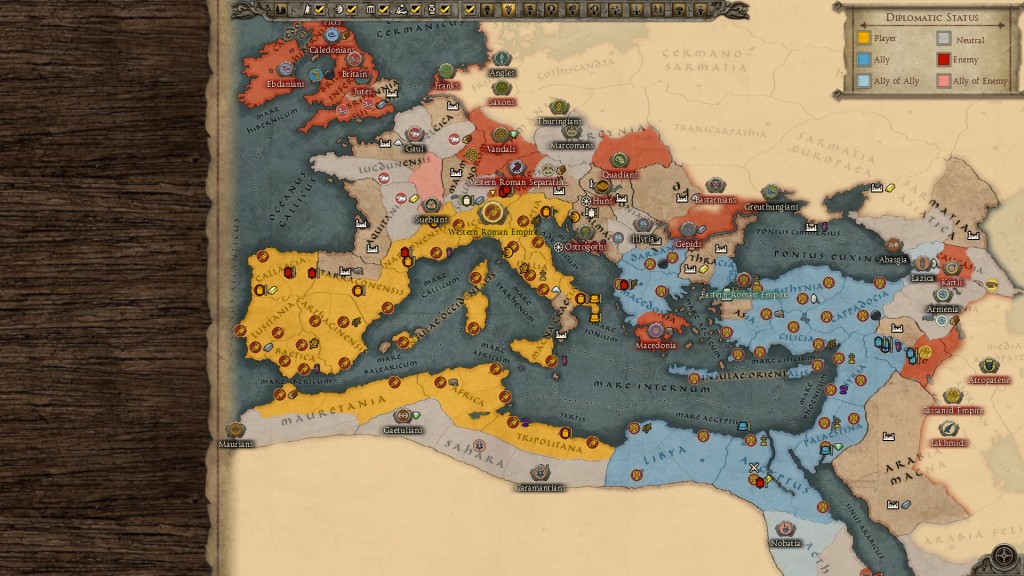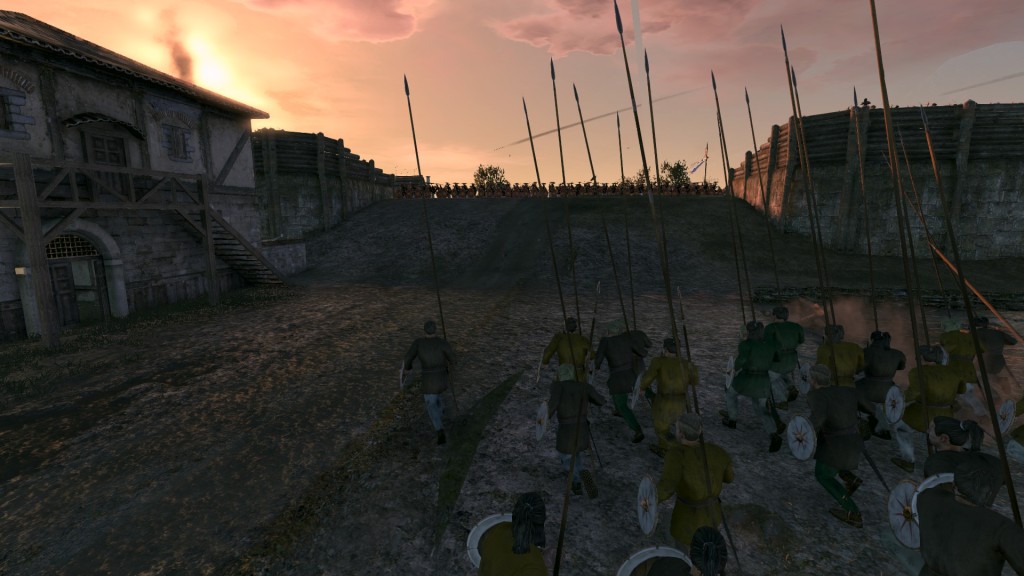I cannot believe that in almost three years of Musical Mondays (how time flies), I have never presented this song. It’s the first battle theme heard in Final Fantasy Tactics – arguably it’s the signature battle theme of FFT. Unfortunately, there has never been an orchestrated or remastered version of the FFT soundtrack; the song below is what you would hear in the original Playstation or PSP game. Enjoy!
Month: March 2015
The Roman Experience in Total War: Attila
After 100 turns, I threw in the towel on my attempt to save the Western Roman Empire. The legions, and my treasury, had finally reached their limit. The barbarians never stopped flooding in, from the north, east, and the hitherto quiet south. City after city had gone up in flames. The Roman Empire was dying by a thousand cuts, and there was no more point in slogging on.
I had a great time.
Thoughts on Cities: Skylines
My first city made as much sense as a noodle-bowl.
At one point, I went nuts building high-rise apartments without ensuring adequate road access. The result was a mess. Commuters clogged the roads. Fire engines, delivery vans, garbage trucks, and even hearses couldn’t get in. Burnt-out buildings, rubbish and dead bodies accumulated. I had to demolish much of that district and build it all over again.
I learned my lesson. Sterling Park, my new high-density district, would be a marvel of urban design. Before the first resident moved in, I ensured all my infrastructure was laid out. New subway lines connected Sterling Park to the rest of my city (and let residents move from one end of the district to the other). Parks and gardens provided green space. A new freight train ensured that the shops could receive goods. I even built a new university campus — my existing one was all the way at the far end of the map. The towers went up. The citizens moved in — and loved it. The land value shot up. I was delighted.
Clippings
- Sid Meier’s Starships is now out, and reviews are mixed. Apparently, it places a bit too much emphasis on the “light” part of “light strategy”; I will probably give it a miss.
- The developers of Endless Legend are planning a new free update, to be followed by an expansion pack in April.
- Another new expansion has been announced for Age of Wonders 3. It will add the Necromancer class and two new species, the Frostlings and the Tigrans,
Remembering Terry Pratchett, 1948-2015
I discovered Terry Pratchett when I was a teen.
I knew of him before then. I spent a lot of time in bookshops, haunting the fantasy & science fiction aisles, and the garish, glorious covers of his books stood out. I think I even played one of the spin-off adventure games. It wasn’t until The Last Hero, released in 2001, that I actually read one of his books. I’ve been a fan ever since.
Pratchett was very funny. I still laugh when I think about the unhygienic frying pan (containing one single nutrient, crying because it was all alone). As observed in many obituaries, he was also remarkably humane. Fantasy and science fiction are packed with unreasoning monsters — “always chaotic evil”, in the old parlance of Dungeons & Dragons. Not Pratchett. Everyone in his novels is a person: sometimes good, sometimes bad, sometimes bigoted or stupid, never mindless. Sometimes, Pratchett played this for laughs, as with vampires who’ve given up drinking human blood. Sometimes, it could underpin an entire story, as in the case of troll vs dwarf racism. And his talents extended beyond Discworld. Readers of this blog might be interested in Only You Can Save Mankind, a clever riff on Wing Commander (and video games more generally). What happens when the aliens decide they’ve had enough of being slaughtered by the player?
Individual Pratchett books were hit or miss. As a whole, his work was great. If asked to pick favourites, I would name two from Discworld: Guards! Guards! and Night Watch, written thirteen years apart. Both star the same character, veteran policeman Sam Vimes. When we meet Vimes in Guards, he’s a pathetic drunk, worn down by a thankless, dangerous career; amongst other things, Guards is the story of Vimes rediscovering his duty. Guards isn’t very deep, and it doesn’t delve into the serious themes that the later books do. It’s also, for me, the single funniest thing Pratchett has written, spoofing everything from secret societies to heroes who always win when the odds are a million to one. Night Watch, in which an older, tougher Vimes finds himself caught up in a revolution, is a different beast — topical, in light of the last few years, and far more serious. The Vimes of Night Watch wears a lilac to commemorate fallen friends; I thought it would be appropriate to use a picture of a lilac to accompany this post.
We are the poorer for Pratchett’s death. I find myself thinking of his take on the afterlife, and specifically, what happens (spoiler warning) to an old schoolteacher who tags along with a group of ageing barbarians. The deceased barbarians can look forward to Valhalla, the teacher knows, but he’s rather surprised when after dying a hero’s death, the Valkyries carry him away to the barbarians’ afterlife. I’m sure the Muses themselves would have showed up for Pratchett.
RIP, Sir Terry. By now, I bet you have the Muses crying with laughter.
Musical Monday: “Swanky Maximino” (Grim Fandango), composed by Peter McConnell
This week’s song is another of my favourites from Grim Fandango. It’s possible to miss it entirely — it plays in one teensy, tiny, optional room — and that would be a shame. It’s so great that I lingered to listen. Enjoy!
Note: I’ve decided to change the format again – the site’s been lagging, and I suspect this because there are too many videos on the front page. Click through for the video.
Clippings
This has been a great few weeks for strategy gaming; we’ve seen the launch of Total War: Attila (very good) and Homeworld: Remastered (on my ‘to play’ list), and Cities: Skylines and Sid Meier’s Starships are imminent. I’ve been playing a review copy of Skylines, so keep an eye out for my thoughts.
In this week’s links:
- Here is a great Hearts of Iron IV preview from Rob Zacny at PCGamesN.
- Oreshika, a Vita RPG high on my watch list, has released to generally positive reviews. Its premise is unique and intriguing – you command a clan with fixed lifespans. They’re born, they adventure, they gain experience, they die, they pass their abilities and heirloom items onto their kids. This sounds about as close as JRPGs will get to XCOM (and Training Roulette) – I plan to pick this up.
- Still on the subject of JRPGs, here is a retrospective of Tri-Ace — the studio that developed one of my favourite series, Valkyrie Profile. Now that Tri-Ace has been acquired by a mobile games developer, I guess I can finally bury my dreams of Valkyrie Profile 3
- A love letter to Grim Fandango‘s Rubacava (spoiler warning).
What I’ve been reading
- An Elephant for Aristotle, by L Sprague de Camp (novel) A troop of horsemen from Alexander the Great’s army transport an elephant from India back to Greece. Unfortunately, this is one more historical novel whose premise is better than its execution. A long way from the author’s best book; it could really have done with the humour and charm that characterise his speculative fiction.
- Girl Genius (webcomic) – For the last couple of weeks, I’ve binged on this long-running “gaslamp fantasy”, whose heroes inhabit a world where seemingly every mad scientist trope is true (at one point, two characters agree that the best way to cure a third is to kill him… and then bring him back to life); the heroine herself is the heir to the maddest, baddest scientists there were. GG is colourful, imaginative, and often funny. It also labours under the weight of a rambling plot, with a new complication or cliffhanger every few pages. I suspect part of the problem is that GG is an ongoing, serialised work, and hence not constrained by the need for concision! Still, worth a look for speculative fiction fans.
Only a Flesh Wound! Total War: Attila impressions
War has come to Rome.
Lands that were Roman for centuries are now desolate or in enemy hands. Northern Spain and the tip of Italy are smoking rubble. The empire’s leading general, Stilicho, is dead with all his army — though they managed to take Alaric, King of the Visigoths, with them. While the legions can notch up the odd victory, the stream of enemies seems endless.
And yet, all is not lost. Sacrificing the frontier bought me fifteen or twenty turns to pour every coin into rebuilding the Empire’s economy — its farms, cities, and waterworks. When a legion is mauled, I can afford to raise a new one; I think I can replenish my ranks faster than the barbarians can replenish theirs. Let us see who lasts longer.
29 turns into the game, the Western Roman Empire is battered, bleeding — and so far, unbroken.
Welcome to Total War: Attila. I expected a tough, fair challenge, and so far, it’s delivered. The Western Empire begins in crisis — its treasury is bleeding, its people are restive, and it’s surrounded by enemies. I’m still surrounded by enemies… but I’ve staunched the bleeding. With the right strategy and a bit of luck, I can see how I might be able to dig myself out. And I think that by avoiding mistakes, I could have done better still.
As this suggests, Attila is much better than its predecessor Rome 2 was at launch. So far, I have suffered one crash; annoyingly, this came right after I won a battle. Other than that, Attila seems polished and stable. The AI is shrewd and aggressive — perhaps a little too aggressive. Multiple AI factions have ignored nearer prey in favour of dogpiling me; I’m trying to defend Spain against three stacks that sailed all the way from the British Isles!
At this stage, I’d say Attila is very good. The caveat is that I’ve only experienced the early game, and only tried a single faction – the Western Empire. If the rest of the game lives up to the start, I think it’ll be one of the stronger entries in the series.
Appendix: starting tips
At the start of the game, the Western Empire has too few legions and too much frontier to defend. As such, the standard opening seems to beabandoning swathes of the Empire and falling back — sometimes all the way to Italy.
My strategy was somewhat less extreme. I pulled back to the shores of the Mediterranean – Spain, Italy, and southern Gaul. (I did not raze entire settlements behind me, as that increases unrest. I just demolished buildings instead.) Putting every penny into the economy seems to be key; otherwise the funds just will not exist to support a military buildup. If necessary, demolish buildings that cost upkeep.
With hindsight, I think I was a bit too hasty to fall back. What I should have done was combine several of the understrength Roman armies, then squash my smaller enemies early on, before they could join forces. That would solve my current problem — too many enemies! It would also be less gamey, and make it more feasible to hold the original frontier.
Whatever you choose, good luck, Imperator.


